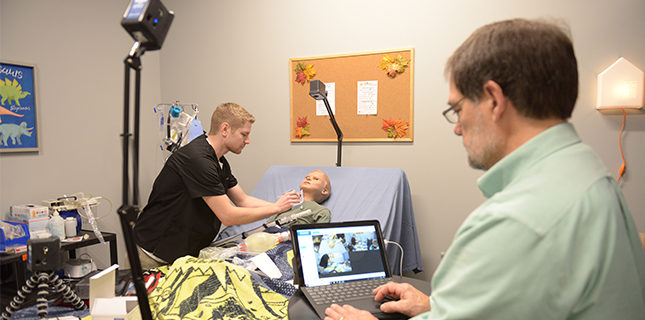PHS Simulation Center Provides Hands-On Education for Students

It has always been a priority for PHS to provide thorough, in-depth education and training to those who will be caring for children with medical complexities. With such a technology-dependent population, it’s crucial that caregivers are well-versed on a patient’s needs and equipment – which is why we are always advancing how we educate this community and offer both classroom and online learning.
After recognizing a gap in education between classroom learning and real-life clinical experience for nursing students, PHS identified the need for a simulation center to provide hands-on learning in a controlled environment and set out to build one in our Roseville office.
Meet HAL and Members of the Team
The simulation team was created in 2017 and began touring other simulation centers, attending simulation conferences, and building relationships with experts in the field; completing extensive research to determine the steps for creating a high-fidelity simulation center that will replicate the needs of a medically complex population and deliver realistic learning opportunities for students.
Enter HAL. The first pediatric simulator in Minnesota, HAL represents a young boy with medical complexities whose health can turn in a minute, much like many patients PHS cares for. Students in the center will be required to determine what is wrong with HAL and resolve his behavior, whether it is a trach obstruction that leads to respiratory distress, a seizure, or any other scenarios created by the PHS team member issuing commands during the simulation.
We recently put a video together to introduce HAL and a few members of the simulation team, and also discuss why this new form of education is so impactful for the home care community.
Learning From Reflection and Review
Following a student’s simulation, they watch a recording of the experience back to identify where they did well and where there is room for improvement. By providing cares hands-on and responding to situations in real-time, students can reflect on how they reacted and what they need to do differently in the future, rather than role playing hypothetical experiences or making errors when the consequences are more severe.
“Giving nurses the opportunity to apply what they’ve learned throughout their program in a controlled simulation setting helps them grow confidence and improve real-life skills crucial for patient care,” says a PHS nurse.
PHS is proud to continue to be a pioneer in the healthcare community, and looks forward to playing a role in helping nurses go into their careers confident and well trained.
Originally published: January 25, 2019

